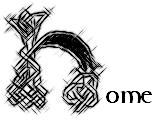
They say you can't have a website without one, so for fear of falling prey to the web police, here it is:
1. I have small hands/fingers. Can I play the low whistle?
This is probably the most commonly asked
question I hear in regards to the low whistle. The answer is, That
depends. It depends on just how small your hands really are, how
large of a space there is between the holes on the specific brand
and/or key of whistle you are trying to play, and how large in diameter
the holes of said whistle are. So the reason this is probably the most
asked question is that there really isn't one good, simple answer for it.
Lets take the Low D for example.
It is true that most low D's require somewhat of a finger stretch to
cover all the holes, especially in regards to the bottom three. But the
distance between these three holes can vary considerably per maker.
Indeed, the stretch on some low D's is so great that it requires the
use of the "pipers grip" (see Technique section) to play, where as
others are small enough to be played using your fingertips. This of
course also depends on how small your hands really are, and
specifically how long your fingers are. As if this wasn't enough, you
also have to worry about how wide your fingers are as well, as the
second hole from the bottom of all low whistles tends to be larger than
the others. Depending on how the whistle is made, this hole can be
quite large in circumference, causing people with thin fingers to have
difficulty completely sealing said hole.
So what can be done? In an ideal
world, one would simply try different whistles until they found one
that worked for them. However, this is an unlikely situation, as few
people live near a store that actually sells low whistles,
consequently, most sales are done via the internet or telephone mail
order. Some makers do have a short trial period built in to their
return policy, but you will still likely be out the cost of shipping.
The best route is to measure your hand, specifically the distance
between the middle of your index finger and the tip of your ring finger
with your fingers splayed as far as you can comfortably separate them.
You can then compare this with the measurements from various low
whistles. Most makers and even distributors are more than happy to
measure their whistles for you, as they don't want them sent back
either. (I will also endeavor to include hole distance measurements on
each low whistle I review in the Instrument Reviews section on this site)
There are some who feel anyone
can play a low whistle regardless of hand/finger size, and that one just needs
to teach their hands to stretch. While there may be some truth to this,
I would think that the process of doing so would be so frustrating, not
to mention painful, that it would take away
from the enjoyment of learning/playing the instrument. All is not
lost however. If your hands do not fit a low D, they may fit a higher
pitch low whistle such as an F or a G, as the shorter a whistle gets,
the smaller and closer together the holes get.
2. What is the best low whistle for a beginner?
This
question generally follows on the heels of the first one, and, like the
first question, has no easy answer. People tend to fall into one
of two different schools of thought when it comes to purchasing a
"beginners" instrument. One is that it is best to buy the lowest priced
instrument possible so that if things don't work out as it were, you
will not have lost that much money. The second, and the side I tend to
fall on myself, is to buy the best instrument you can afford (and maybe
just a bit more than you can afford!). The old adage of "you get what
you pay for" generally tends to hold true with musical instruments,
including low whistles. A higher quality, well-made whistle is going
to; a) Play easier. "Cheaper" whistles tend to have more
idiosyncrasies, such as unusual air/breath requirements and breaking or
warbling between octaves or on specific notes. These issues can
add unnescessary frustration on top of the usual
vexation of just learning a new instrument. b) Sound better. You
are going to be more motivated to practice and feel better about your
playing if you like the sound that comes out of your whistle. c)
Have a higher resale value. If in the end you decide the low whistle
just isn't for you, you'll have a better chance of recouping some of
your investment. Conversely, if you do stick with it, you'll have more
money to put towards an even better whistle later on.
With this in mind, my current
recommendation for a low whistle that would be good for a beginner (and
I reserve the right to change my mind at any time as I try out new
whistles) is a Chieftain by Kerrywhistles. These are excellent whistles
for a variety of reasons, which I intend to address on the Instrument Reviews section
of this website and will therefore not repeat here.
Price wise, they tend to fall about in the middle when compared
to other low whistles. At the time of this writing, a non-tunable low D
Chieftain could be had for $180.00 US and were available directly from
the maker for 115 lbs sterling. If that's just a
bit out of reach
financially, my second recommendation would be either a Kerry or a
Dixon abs (for more info on these
whistles see the Makers
section). Keep in mind that any of these whistles can also be
found used
for less on ebay and for private sale on the Chiff and Fipple forum website. The Irish Flute store also often has good deals on nice used low whistles.
For those for whom money is very
much a going concern, or for those who subscribe to the first school of
thought mentioned above, there are a few low whistles, generally made
from PVC, going for anywhere from $100 down to $25. These include Brady
whistles from Hawaii and Jubilee whistles (see the Makers
section for more details and contact info). Or, if your feeling handy,
you can make one yourself out of PVC using the detailed instructions Here, kindly given by Dr. Guido Gonzato of Italy.
3. Should I learn the "High" whistle before I learn the Low whistle?
It is a common misconception, in my not so humble
opinion, that one should learn how to play the "high" whistle before
learning how to play the low whistle. While it can certainly be argued
that learning to play the high whistle may be a somewhat easier task,
being able to play one does not necessarily give you a leg up on
learning how to play the Low whistle. High whistles are generally
played using the pads of the fingertips, where low whistles are
generally played using the pipers grip (see Technique
section). Having instilled into ones muscle memory how to
play using the fingertips, one would then have to "re-train" their
fingers, compared to a complete beginner who would just learn the
pipers grip from the start. Further more, not all fingering on a Low
whistle is exactly the same as a High whistle, and the air requirements
and breath control required to play each instrument is very different
as well. This is not to say that a High whistler cannot or should not
learn the Low whistle, simply that no one should feel obligated to
learn the high whistle in order to learn the Low.
But most importantly, if you, like myself, are drawn
to the Low whistle for it's intrinsic attributes, and maybe feel that
High whistles are, well, too high (dare I say shrieky?), then why waste
your time learning an instrument that you're not really interested in
playing and just go straight for the good stuff!
4. Who played the Low whistle on the soundtrack to the movie "Titanic"?
The Low whistles heard in the soundtrack to the
movie "Titanic", including the song "My Heart Will Go On" sung by
Celine Dion, were Chieftains played by Tony Hinnigan (see Players
section) Tony has pretty much become the go-to man for whistles and
other world flutes in general for movie soundtracks these days.
5. What Low whistle did Davy Spillane play in Riverdance?
This has been a much debated and disputed topic.
More in-depth details on this enigma can be found here at the Chiff and Fipple website. The bottom line currently is we don't know and he's not telling!
